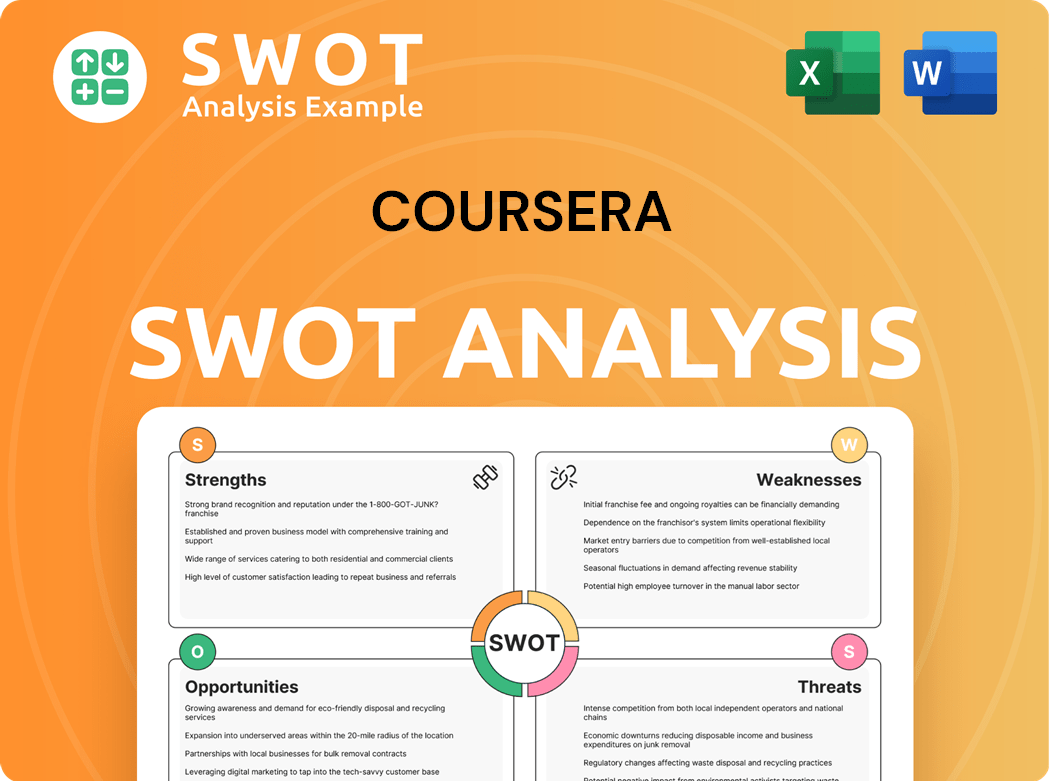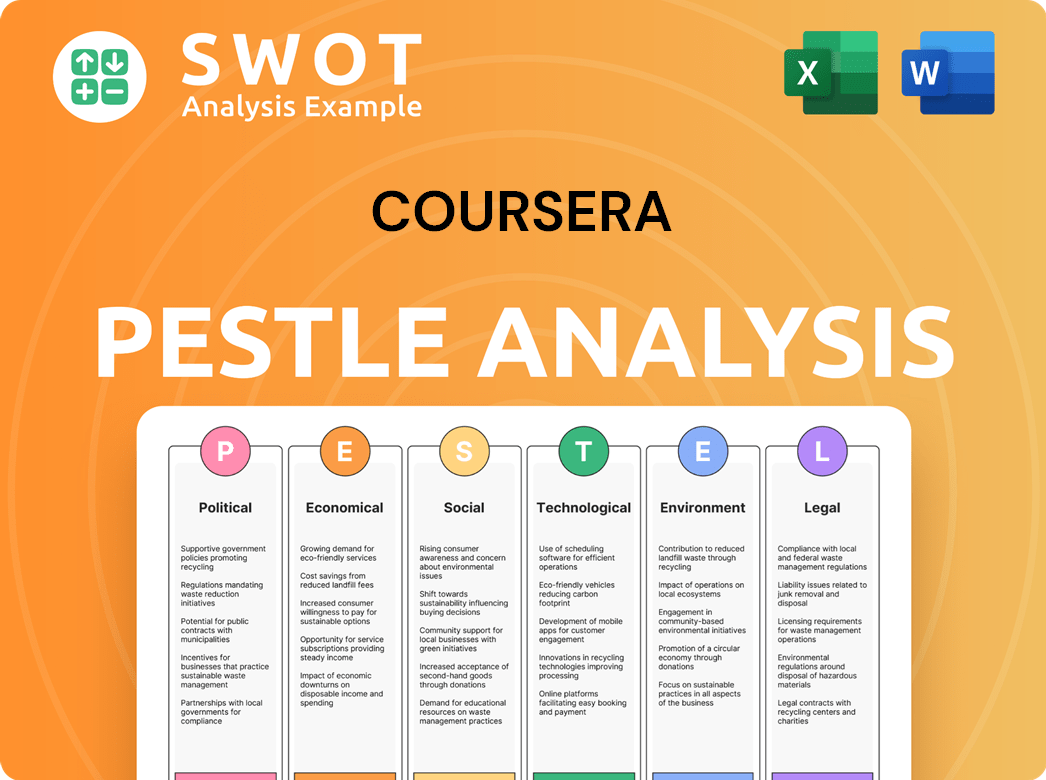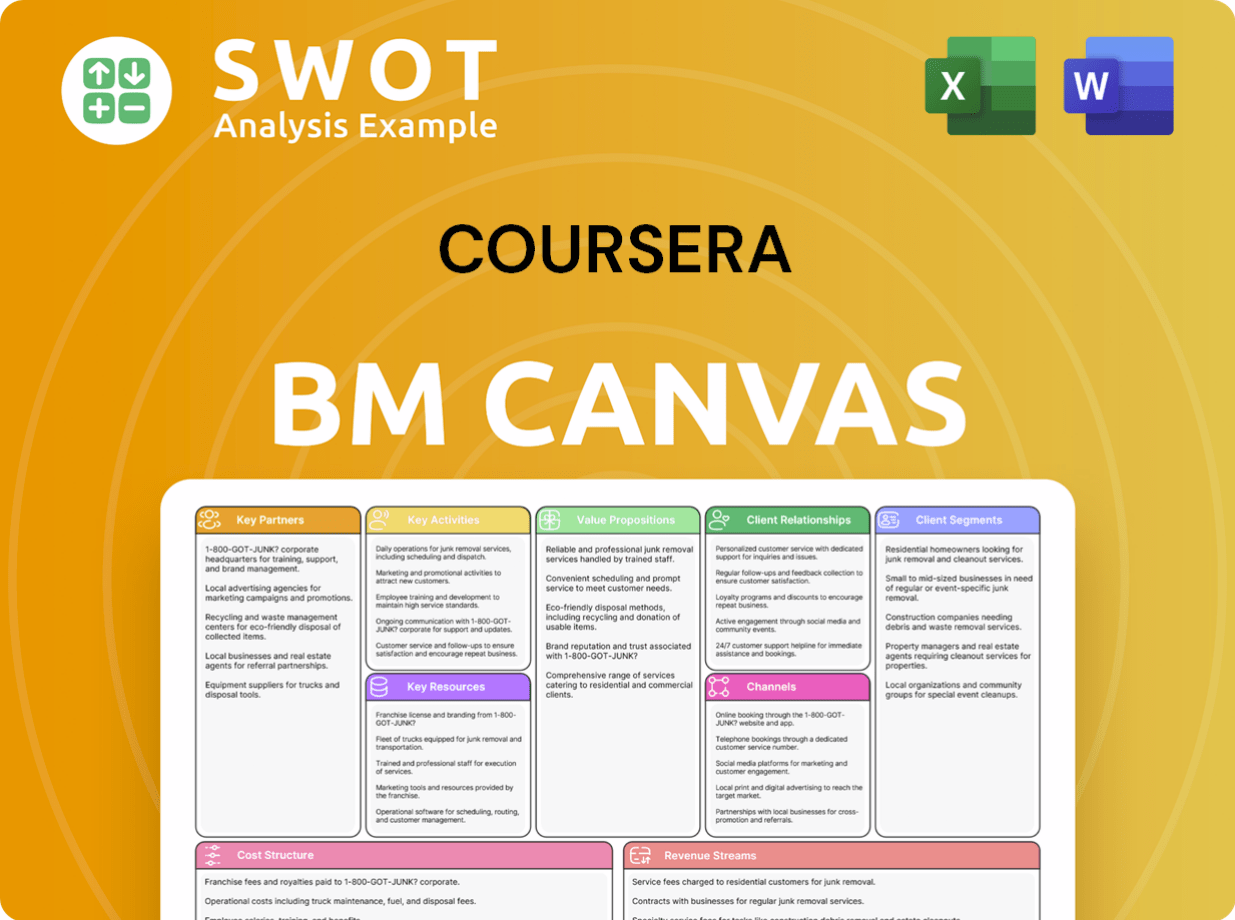Coursera Bundle
What Drives Coursera's Success: Mission, Vision & Values?
Understanding a company's core principles is crucial for anyone looking to invest, partner, or simply learn more. Coursera, a leader in online education, has a clearly defined set of these principles. This exploration delves into Coursera's guiding lights, revealing how they shape its strategy and impact the future of learning.

Coursera's commitment to its Coursera SWOT Analysis, mission, vision, and core values is not just about words; it's about action. These elements are the foundation upon which Coursera builds its strategy, pursues its objectives, and ultimately, strives to achieve its long-term goals in the ever-evolving landscape of online education. Discover how Coursera's approach to online learning is changing the game and impacting education globally by examining its core values examples and mission statement.
Key Takeaways
- Coursera's mission centers on accessible, high-quality education globally.
- The vision paints a future driven by education's transformative power.
- Core values (access, innovation, impact, collaboration, excellence) shape operations.
- Alignment with principles is key for navigating industry changes and AI.
- Coursera's purpose drives expansion, learner empowerment, and societal impact.
Mission: What is Coursera Mission Statement?
Coursera's mission is 'to provide universal access to world-class learning so that anyone, anywhere has the power to transform their life through learning.'
The Coursera mission centers on democratizing education, making high-quality learning accessible globally. This commitment is reflected in their extensive partnerships and flexible learning options. Understanding Coursera's mission is crucial for grasping its impact on the education sector and its strategic direction.
Coursera aims to break down geographical barriers to education. Their platform offers courses in multiple languages, reaching learners worldwide. This global reach is a key component of their mission.
Coursera targets individuals seeking skill development, career advancement, or personal enrichment. The platform caters to a diverse audience, from students to professionals. This broad appeal supports its mission of universal access.
Coursera provides a wide range of educational products, including courses, Specializations, and degrees. These offerings, developed with top institutions, are central to fulfilling their mission. They also offer Professional Certificates.
The market scope is global, with a focus on expanding access to education. Coursera's impact is seen in the millions of learners who have benefited from its platform. The platform has over 150 million registered learners as of late 2024.
The unique value lies in providing access to high-quality, job-relevant credentials. This focus on practical skills and recognized qualifications is a key differentiator. Coursera's focus on job-relevant skills is a core aspect of its value proposition.
Coursera partners with over 350 universities and industry leaders. They offer flexible and affordable learning options, including financial aid. These initiatives directly support their mission.
The Coursera mission is deeply intertwined with its operations. For example, partnerships with leading institutions ensure content quality and relevance. The freemium model and financial aid programs further demonstrate their commitment to accessibility. The company's approach to online learning is a direct reflection of its mission. To understand how Coursera generates revenue and sustains its operations, one can refer to Revenue Streams & Business Model of Coursera. Furthermore, Coursera's strategic objectives are clearly aligned with its mission, aiming to expand its reach and impact on global education. Understanding Coursera's goals and Coursera's strategy is essential to appreciate its long-term vision. The Coursera vision is to become the leading platform for online education, empowering individuals and transforming lives worldwide.
Coursera SWOT Analysis
- Complete SWOT Breakdown
- Fully Customizable
- Editable in Excel & Word
- Professional Formatting
- Investor-Ready Format

Vision: What is Coursera Vision Statement?
Coursera's vision is "to envision a world where anyone, anywhere has the power to transform their life through learning."
Let's delve into the profound implications of Coursera's vision statement.
At its core, the Coursera vision paints a picture of global transformation. It's a future where education is not a privilege, but a readily available tool for personal and professional growth. This vision is ambitious, aiming to reshape societies through the power of accessible learning experiences.
The Coursera vision explicitly targets the removal of geographical and socioeconomic barriers. This commitment is crucial in a world where educational opportunities are often unevenly distributed. By offering courses online, Coursera aims to level the playing field, providing access to high-quality education regardless of location or financial status. This aligns with its Coursera mission to democratize education.
Coursera's global footprint is a testament to its commitment to its vision. With over 168 million registered learners as of December 31, 2024, the platform's reach is undeniable. This widespread adoption demonstrates the potential of online learning to create a significant global impact. The Coursera goals are clearly aligned with expanding this reach further.
Collaborating with over 350 leading institutions is a key element of Coursera's strategy. These partnerships are essential for delivering world-class education. This collaborative approach not only enhances the quality of the courses offered but also broadens the platform's appeal and credibility. Understanding the Coursera strategy is key to appreciating its vision.
The emphasis on "transformative learning experiences" signifies Coursera's ambition to go beyond simply providing information. The platform aims to facilitate tangible, positive changes in learners' lives, such as career advancement and personal development. This focus on outcomes is a critical aspect of the Coursera objectives.
The Coursera vision is not static; it is a dynamic aspiration. As technology evolves and the needs of learners change, Coursera will likely adapt its offerings and strategies to remain at the forefront of online education. For more insights into their approach, consider exploring the Marketing Strategy of Coursera.
In summary, the Coursera vision is a powerful statement of intent, driving the company to create a world where education is accessible to all, leading to personal and societal transformation. Understanding this vision is essential for anyone seeking to understand the company's direction and its impact on the future of learning. The Coursera core values support this vision.
Coursera PESTLE Analysis
- Covers All 6 PESTLE Categories
- No Research Needed – Save Hours of Work
- Built by Experts, Trusted by Consultants
- Instant Download, Ready to Use
- 100% Editable, Fully Customizable

Values: What is Coursera Core Values Statement?
Understanding the core values of Coursera is crucial to grasping its operational philosophy and its impact on the educational landscape. These values are not merely aspirational; they are the guiding principles that shape Coursera's actions and define its identity.
Coursera is deeply committed to making high-quality education accessible to learners worldwide, which is a key component of its mission. This commitment is reflected in its freemium model, financial aid programs, and partnerships. As of late 2024, Coursera has provided financial aid to over 1.5 million learners, underscoring its dedication to democratizing education and its impact on education.
Innovation is at the heart of Coursera's approach to online learning and educational technology. The platform continuously develops new features and tools, such as Coursera Coach and Course Builder, to enhance the learning experience and meet the evolving needs of learners and enterprise customers. Coursera's investment in AI-powered learning tools shows its commitment to staying at the forefront of ed-tech.
Coursera is dedicated to transforming lives and careers through education. This is evident in the success stories of learners who have achieved career advancement and personal development through the platform. Coursera's focus on job-relevant credentials and skills reflects its commitment to providing education that leads to tangible outcomes, which is a key aspect of its strategic objectives.
Collaboration is a fundamental value for Coursera, as demonstrated by its extensive network of over 350 university and industry partners. This collaborative approach ensures a diverse and relevant content library. This network is critical to achieving Coursera's long-term goals by providing a wide range of courses and specializations.
These core values are central to understanding Coursera’s identity, influencing its strategic decisions and its approach to online learning. The company's commitment to these values is further reinforced by its status as a Public Benefit Corporation and a certified B Corp®. To understand how these values translate into action, let's explore how the Coursera mission and vision influence the company's strategic decisions. Also, to better understand who Coursera is targeting, you can read more about the Target Market of Coursera.
How Mission & Vision Influence Coursera Business?
Coursera's unwavering commitment to its mission and vision profoundly shapes its strategic decisions and operational execution. This influence extends across various facets of the company, driving its growth and impact in the online education landscape.
The Coursera mission of providing universal access to world-class learning is a cornerstone of its partnership strategy. This commitment has fostered collaborations with over 350 diverse institutions globally, expanding the reach of high-quality education.
- These partnerships directly contribute to Coursera's goals of increasing accessibility and broadening its course offerings.
- The diverse range of partners ensures a wide variety of subjects and perspectives are available to learners worldwide.
- This approach aligns with Coursera's values and principles of inclusivity and global impact.
- The expansion of partnerships is a key element of Coursera's strategy for growth.
Driven by its Coursera vision of empowering individuals, the company continuously develops products that focus on job-relevant skills and career advancement. This is a direct response to the needs of learners seeking to transform their lives through education.
Coursera’s product development prioritizes emerging fields. In 2024, educator partners launched over 450 courses teaching emerging skills in generative AI, reflecting a proactive approach to meet evolving market demands. This helps learners stay ahead of the curve.
The launch of new entry-level Professional Certificates in high-demand fields, like generative AI, is a strategic move. This provides accessible pathways for individuals to gain in-demand skills and advance their careers, aligning with Coursera's mission to democratize education.
Coursera actively seeks to broaden access to education in underserved communities. The partnership with the Higher Education Commission (HEC) Pakistan, aiming to equip up to 120,000 students with in-demand skills, exemplifies this commitment. This demonstrates Coursera's core values examples in action.
Coursera's financial performance reflects its commitment to its mission. In 2024, the company delivered its first full year of positive Adjusted EBITDA and generated over $59 million of Free Cash Flow. This demonstrates sustainable growth while pursuing its mission and Coursera's long-term goals.
Coursera's approach to online learning has a significant impact on education. The company’s focus on accessible, job-relevant skills helps individuals gain knowledge and skills. To learn more about the company’s financial performance, consider reading about the Owners & Shareholders of Coursera.
In conclusion, Coursera's mission and vision are not merely aspirational statements; they are the driving forces behind its strategic decisions, shaping its partnerships, product development, market expansion, and financial performance. Understanding Coursera's core values is key to appreciating its impact on the education landscape and its commitment to empowering individuals worldwide. The next chapter will delve into the core improvements to the company’s mission and vision.
Coursera Business Model Canvas
- Complete 9-Block Business Model Canvas
- Effortlessly Communicate Your Business Strategy
- Investor-Ready BMC Format
- 100% Editable and Customizable
- Clear and Structured Layout

What Are Mission & Vision Improvements?
While Coursera's foundational statements are robust, there's always room for strategic enhancement to ensure continued relevance and impact. These improvements focus on aligning Coursera's mission, vision, and core values with emerging technological trends and evolving societal expectations.
To strengthen its Coursera vision, explicitly incorporating the role of Artificial Intelligence (AI) is crucial. This would involve amending the vision to specifically mention the use of AI to personalize and scale learning experiences. This acknowledges the transformative potential of AI in education, a trend already reflected in the growth of AI-powered learning tools and platforms.
Given Coursera's B Corp status and the increasing importance of Environmental, Social, and Governance (ESG) factors, integrating sustainability into their Coursera core values is vital. This could involve adding a core value focused on environmental sustainability, reflecting a commitment to reducing their environmental footprint and promoting sustainable practices within their operations and content offerings. This aligns with the growing demand from stakeholders for corporate social responsibility.
To further solidify its relevance, Coursera could refine its Coursera mission statement to explicitly address the evolving landscape of the future of work. This could involve emphasizing the provision of skills and knowledge that are in high demand in the modern job market, particularly those related to emerging technologies and digital transformation. This would reinforce Coursera's commitment to equipping learners with the tools they need to succeed in a rapidly changing professional environment, as detailed in this article about the Growth Strategy of Coursera.
To enhance the effectiveness of Coursera goals, the company could focus on quantifying its impact and setting measurable objectives. This includes tracking metrics related to learner outcomes, such as job placement rates, salary increases, and career advancement. This data-driven approach allows for continuous improvement and demonstrates the tangible value of Coursera's offerings, strengthening its position in the competitive online learning market. For example, Coursera could aim to increase the percentage of learners reporting career advancements by a specific percentage within a defined timeframe.
How Does Coursera Implement Corporate Strategy?
The successful execution of Coursera's mission, vision, and core values is crucial for its long-term success and impact on the education landscape. This implementation strategy involves various business initiatives, leadership decisions, and communication efforts designed to translate these guiding principles into tangible actions and outcomes.
Coursera's commitment to its mission and vision is evident in its strategic business initiatives. These initiatives are carefully designed to support Coursera's goals and objectives.
- Entry-Level Professional Certificates: A prime example is the development of entry-level Professional Certificates. These certificates are specifically crafted to equip learners with job-ready skills, providing a clear pathway to employment. In 2024, Coursera's partners launched nearly 40 new entry-level Professional Certificates, reflecting a continuous effort to meet the needs of the job market.
- Focus on Skills-Based Learning: Coursera's approach emphasizes skills-based learning, ensuring that courses and programs are relevant to current industry demands. This focus directly supports the mission of transforming lives through learning by providing practical skills.
- Partnerships with Educational Institutions and Corporations: Collaborations with top universities and industry leaders allow Coursera to offer high-quality content and expand its reach. These partnerships enhance the platform's credibility and broaden its course offerings.
- Global Expansion and Accessibility: Coursera's commitment to global expansion ensures that its educational resources are accessible to a wider audience. This supports the vision of providing accessible education worldwide.
Leadership plays a pivotal role in embodying and reinforcing Coursera's mission, vision, and core values. The CEO and other executives set the tone for the entire organization.
The appointment of Greg Hart as CEO highlights Coursera's dedication to innovation and customer focus. His background in technology-driven businesses aligns with Coursera's mission of expanding access to education and driving innovation in online learning. Leadership decisions, such as strategic partnerships and investment in new technologies, further demonstrate the commitment to the company’s vision. These actions ensure that Coursera remains at the forefront of online education.
Coursera effectively communicates its mission, vision, and core values to its stakeholders through various channels. Transparency and clear messaging are key to building trust and aligning everyone with the company's goals.
Key communication channels include the Coursera website, annual reports, and investor relations materials. The 2024 Impact Report specifically illustrates how Coursera brings its mission to life through its business operations and social impact initiatives. These reports provide detailed insights into the company’s performance and its commitment to its stated values. Additionally, Coursera uses social media and public relations to share its story and engage with its audience.
Coursera's core values are not just statements; they are integrated into its business practices. This alignment ensures that the company's actions reflect its stated principles and contributes to a positive corporate culture.
Examples of this alignment include Coursera's commitment to diversity, equity, and inclusion (DEI) within its corporate culture and through programs like the Social Impact Program Pathways. These pathways offer upskilling opportunities in high-demand digital fields, supporting Coursera's mission to democratize education. Furthermore, Coursera's Public Benefit Corporation status and B Corp certification serve as formal systems to ensure accountability and alignment with its social mission. These certifications demonstrate Coursera's dedication to balancing profit with purpose. For more insights into the competitive landscape, you can explore the Competitors Landscape of Coursera.
Measuring and evaluating the impact of Coursera's initiatives is crucial for assessing their effectiveness and making data-driven improvements. This involves tracking key performance indicators (KPIs) and gathering feedback from learners and partners.
Coursera uses various metrics to assess its performance, including the number of learners, course completion rates, job placement rates, and the impact of its social impact programs. Regular impact reports and surveys provide valuable insights into the effectiveness of its programs and the overall alignment with its mission and vision. These evaluations help Coursera refine its strategies and ensure it continues to meet its goals.
Coursera Porter's Five Forces Analysis
- Covers All 5 Competitive Forces in Detail
- Structured for Consultants, Students, and Founders
- 100% Editable in Microsoft Word & Excel
- Instant Digital Download – Use Immediately
- Compatible with Mac & PC – Fully Unlocked

Related Blogs
- What are Mission Vision & Core Values of Coursera Company?
- What is Competitive Landscape of Coursera Company?
- What is Growth Strategy and Future Prospects of Coursera Company?
- How Does Coursera Company Work?
- What is Sales and Marketing Strategy of Coursera Company?
- Who Owns Coursera Company?
- What is Customer Demographics and Target Market of Coursera Company?
Disclaimer
All information, articles, and product details provided on this website are for general informational and educational purposes only. We do not claim any ownership over, nor do we intend to infringe upon, any trademarks, copyrights, logos, brand names, or other intellectual property mentioned or depicted on this site. Such intellectual property remains the property of its respective owners, and any references here are made solely for identification or informational purposes, without implying any affiliation, endorsement, or partnership.
We make no representations or warranties, express or implied, regarding the accuracy, completeness, or suitability of any content or products presented. Nothing on this website should be construed as legal, tax, investment, financial, medical, or other professional advice. In addition, no part of this site—including articles or product references—constitutes a solicitation, recommendation, endorsement, advertisement, or offer to buy or sell any securities, franchises, or other financial instruments, particularly in jurisdictions where such activity would be unlawful.
All content is of a general nature and may not address the specific circumstances of any individual or entity. It is not a substitute for professional advice or services. Any actions you take based on the information provided here are strictly at your own risk. You accept full responsibility for any decisions or outcomes arising from your use of this website and agree to release us from any liability in connection with your use of, or reliance upon, the content or products found herein.